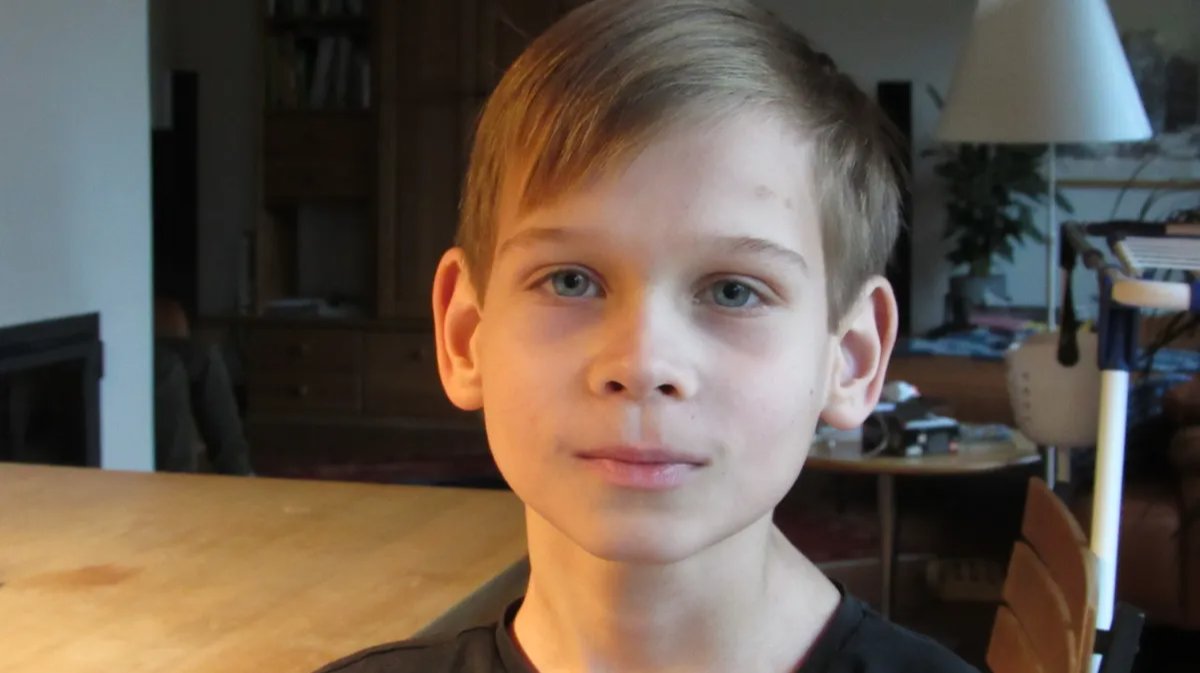When you see a Ukrainian refugee crying on the streets of a European city, there is only one thought running through your head, and it’s a scary one:
“What happened?”
“A miracle! It’s a miracle!” she suddenly replies, wiping away tears. And then she smiles. “Do you remember the boy with a hunchback? He was cured! He had surgery, he no longer has a hunchback! Can you believe it?”
When 11-year-old Arsenii Kolesnik woke up from anaesthesia in a Swiss clinic, he also couldn’t believe it; he kept asking his mum:
“You’re not lying to me, my back is normal?.. Will I stay this way?”
This is how I accidentally, out on the street, learnt about this happy news. Of course, I remembered Arsenii. He would often stop by the kitchen where our international brigade of volunteers was cooking for 80 Ukrainian refugees. But he was looking for conversation and not food, he was always asking us questions. One time, I even saw him talk to our chef, and was gobsmacked — how are they able to talk to each other? The Swiss man didn’t know a word of Ukrainian and the only Russian word he knew was “potato”.
A pensioner and three pupils
Arsenii, his older brother Illia, and their father Volodymyr moved to the town of Schaffhausen from a migrant centre, to the house of a forest engineer, Bruno Schmid. Arsenii’s mum Alyona arrived only for the surgery. She spent about a month in Switzerland, making sure Arsenii got better, and then went back to Ukraine, to her elderly parents.
I find Bruno’s house easily — there’s a yellow-blue flag seen through the window. When millions of Ukrainian refugees crossed the Polish border last March, Bruno filed an application with social services, stating that he would like to house some of them in his house.
“I thought: I live on my own (my children are adults and live separately), I’ve got the time (I’ve just retired), and I’ve got enough space,” Bruno tells me.
“And just before Easter I received a phone call: we have refugees for you, a grandad and two grandsons. Then it turned out to be a father and two sons.”
Volodymyr is 61, he had children late in life. He used to work as a PE teacher and power triathlon trainer. But during the 1990s, one had to find ways to make money, so he became a driver and started transporting people and cargo; he has travelled all over Europe at the wheel of a minibus.
Now, all three of them go to school every day. The boys go to regular schools, and Volodymyr studies at a language centre.
“So, are you doing well [in school]?” I ask the oldest pupil.
“I can communicate well enough,” Volodymyr replies. “If out of five words, you pronounce two-three correctly — you’ll be understood. But all these accusatives and datives [cases of nouns]— I can’t!”
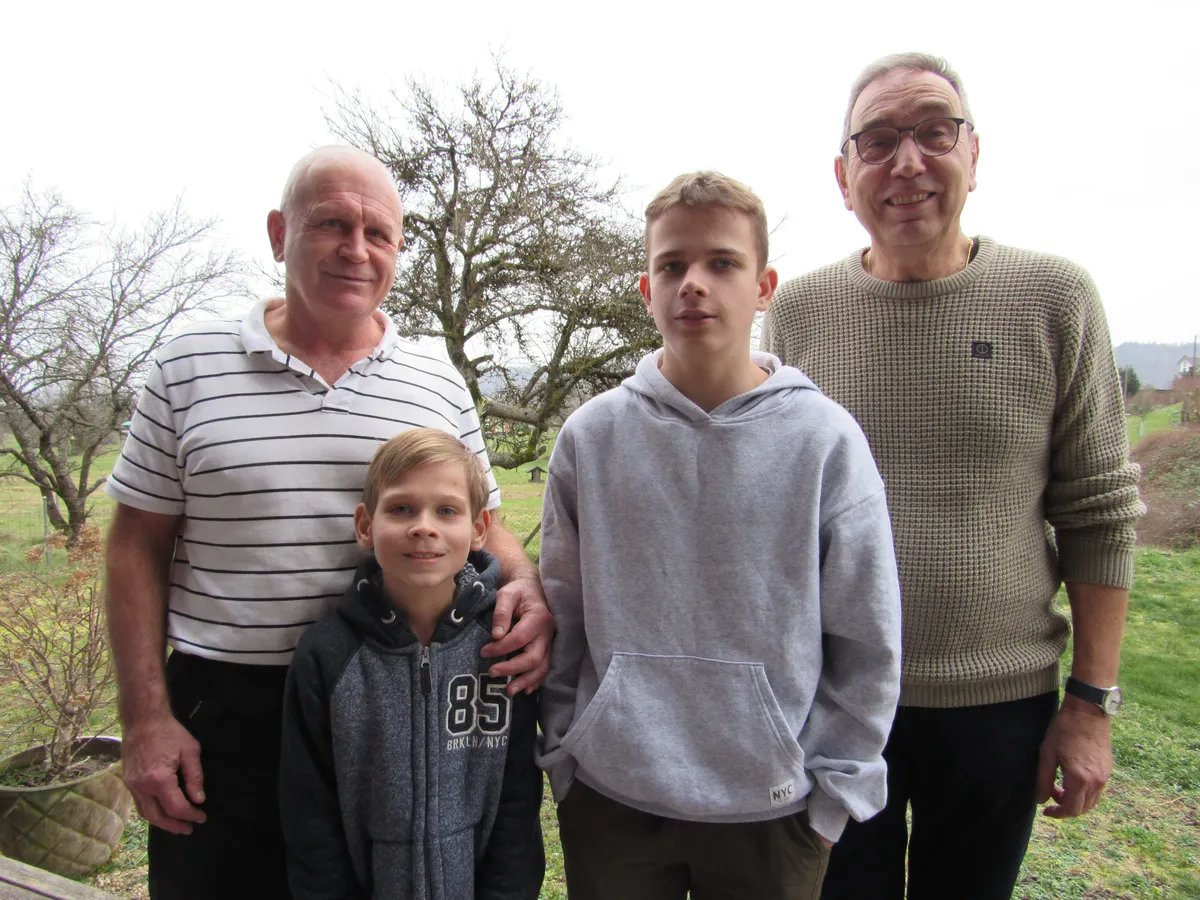
Volodymyr, Arsenii, Iliia, Bruno. Photo: Ekaterina Glikman for Novaya Gazeta Europe
Bruno realises what the topic is and chimes in:
“I can speak Ukrainian a little bit!”
While Volodymyr and Bruno are describing the hospital saga in different languages, I keep looking at Arsenii who’s sitting nearby; he’s a thin, almost ghost-like boy. I notice how much his face changed. His mum will tell me the same thing later on. It could be that before he looked at everyone sideways, from below. Now, he is looking straight ahead.
Glück im Unglück
Arsenii was born completely healthy, but when he was eight months old, he got very ill. His legs started going numb first, then his arms, then his chest, he ended up paralysed… In the hospital, he got better, but he was never properly diagnosed. The parents thought it might be because of a vaccine, but the doctors said it was probably a neuroinfection.
After the illness, the boy’s spine got “twisted”, Volodymyr says.
“You could already see it: one leg too long, a rib sticking out.” He shows me how he used to rock the baby in his arms and how the leg would stick out.
His parents took Arsenii to different doctors, to Kharkiv, Kyiv, but the answer remained the same: there’s nothing to be done now. Still, Volodymyr never lost hope. After ending up in a Swiss refugee camp, he immediately asked whether his son could be seen by a doctor. But he was told: please wait, we have to get you accommodation first.
When Bruno saw Arsenii, he decided to do everything in his power to get him treatment.
“I just saw him as my own child,” Bruno explains.
The first doctor they saw was paediatrician Sergio Stocker. He said he had never seen such a severe case of scoliosis before in his life and promised to immediately contact the University Hospital of Zürich. They eventually were seen by Thomas Dreher, Chief of Paediatric Orthopaedics. He said that Arsenii had to be examined. He redirected them to the Department of Orthopaedic Surgery of the Balgrist University Hospital.
“And once again we got lucky; two weeks later, we were at a consultation in the clinic,” Bruno says.
“I’ve generally noticed that everyone’s been very helpful and all the doors were opened before us. We could’ve been waiting for this consultation for half a year!”
They were seen by Professor Mazda Farshad, Medical Director of the Balgrist University Hospital. He examined Arsenii and, according to Bruno, decided less than a minute later: “I’ll operate.” Then the professor told his assistant: “[Book them for] the closest date I have available.” The date available was six weeks later.
Here, Bruno grew worried. He asked the professor: “You could maybe give us the information on how much this will cost first. And then I’ll call the insurance company and find out whether they can pay for it.” But Dr. Farshad replied: “Herr Schmid, you don’t have to do anything, this isn’t on you, we will deal with it ourselves. That’s decided.”
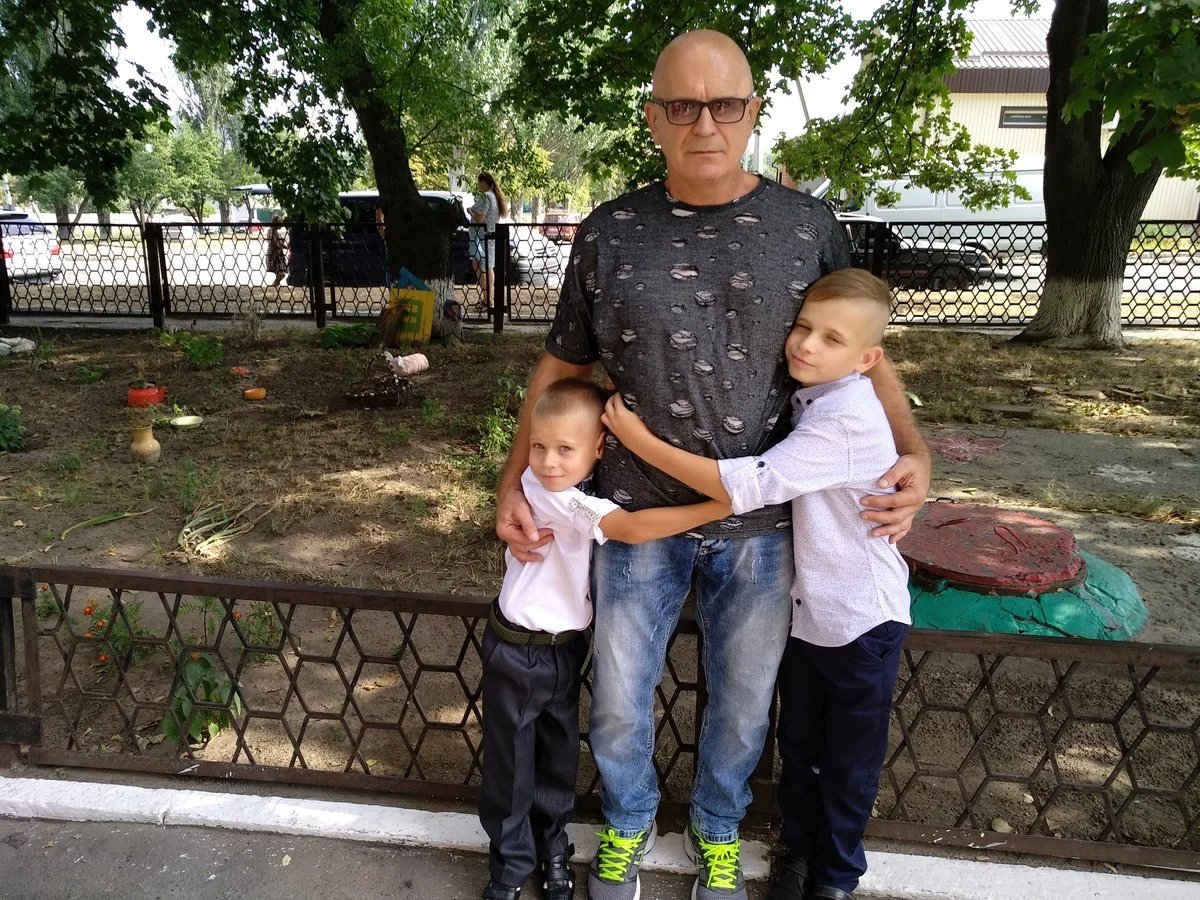
Volodymyr with his sons. Photo from the personal archive
“It was like a Christmas miracle,” Bruno reminisces. “A surgery like that could cost from 100,000 to 200,000 francs. But no one asked for money, didn’t ask whether he was a refugee or not, he was treated like a Swiss child.”
When Volodymyr realised that the professor agreed to operate, he made an offer: “I’ll start working and will work for free until I’ve repaid you.” The professor smiled: “You’d have to work for a long time.”
Bruno shows me Arsenii’s scans. Volodymyr turns away: “To be honest, I’m afraid to even look at them.” Bruno explains:
“Here, he was bent 90 degrees. And his spine is not only bent, it’s also curled around the axis. One of his legs is shorter than the other. His left lung turned out to be small, squeezed down. He could breathe only through his right lung. Here’s the scan after.”
A straight spine! There are titanium rods, two screws for every vertebra along his spinal cord. The left lung spread out. And now he’s 10 cm taller!
“Yes,” Volodymyr turns to Arsenii. “The professor said that you would start growing now. If you eat well.”
“I’m eating!” Arsenii replies in a thin voice.
He weighs only 22 kg — an average weight for a six-year-old, but Arsenii turns 12 in March. Nothing about him is average, though; Arsenii is special.
“Glück im Unglück,” is how Bruno finishes the story.
“What’s he saying?” Volodymyr asks.
“The same thing you said before: ‘a blessing in disguise,’” I reply.
Two awakenings
Instead of the promised four hours, the surgery took five.
“As I understood it, they were planning on one thing, but during the surgery it became clear that they needed to remove a vertebra,” Volodymyr tells me. “Can you imagine what that means? All the nerves are there. Had I known they were going to do that, I would never have agreed to the surgery. You see, it was a matter of life or death, both his and mine. I would not survive without him — that’s for sure.”
During that additional hour, Volodymyr, in his own words, almost went crazy. He was about to go to the operating room, but at last the call came. And the doctor’s voice spoke Russian with an accent: “Congratulations. The surgery was a success.” Volodymyr was in shock and could only reply with: “I love you.”
“When we came down to see him 1.5 hours later, I called him by his name. He couldn’t open his eyes, they were swollen. I kept telling him: ‘Can you hear me? Do you recognise me?’ He said: ‘You’re Dad.’ And there were tears in his eyes. Then: ‘You’re Mum’. And then: ‘And that’s Bruno’...”
At this part, Bruno breaks into a happy smile. Language barrier is not a problem for this family.
Arsenii wanted to have only his mum with him. The poor woman sat at his bedside for several days, without sleeping. Volodymyr wanted to let her have a break, but Arsenii wouldn’t let her leave.
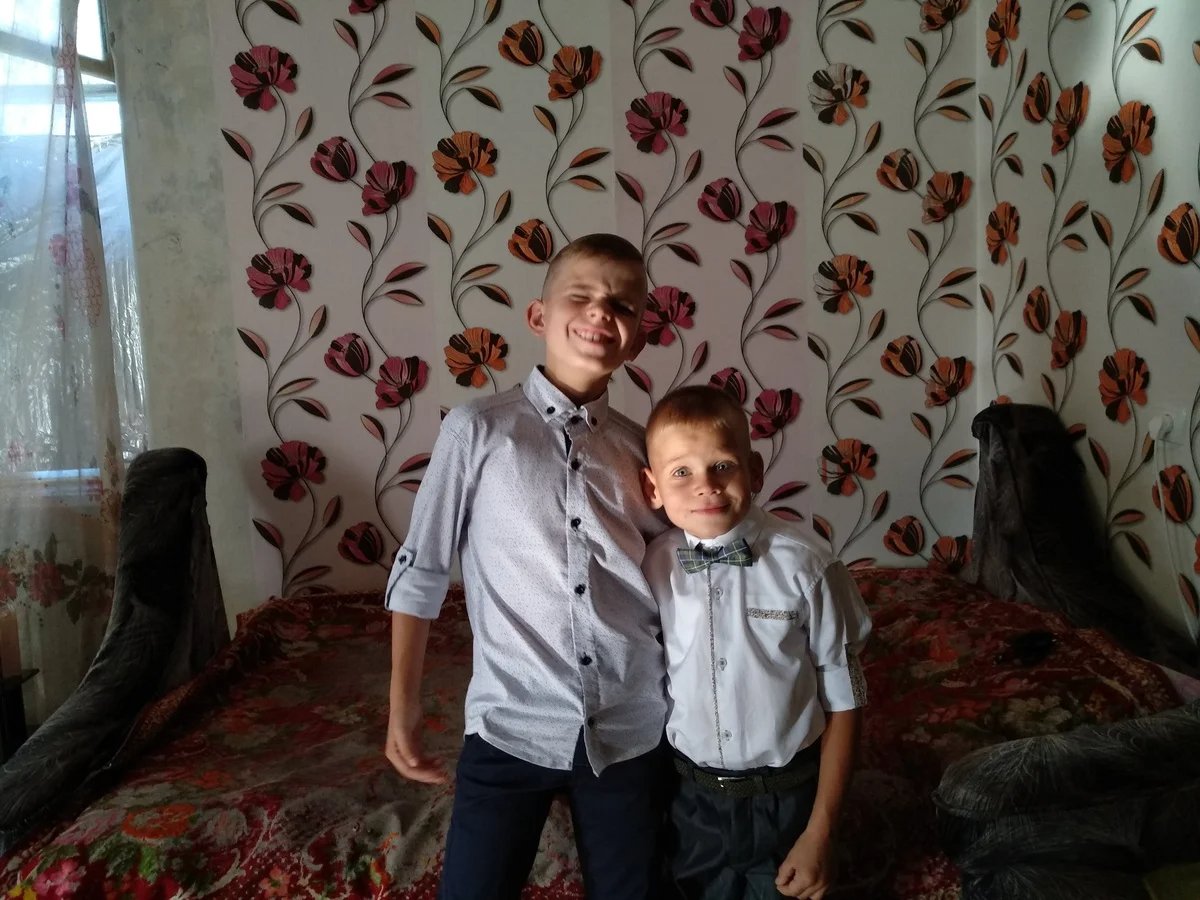
Illia and Arsenii. Photo from a personal archive
…On 24 February, Volodymyr woke up and turned the TV on immediately.
“I’m seeing missiles. I hear: ‘infrastructure facilities hit’, ‘damages’… I was like: I don’t get it, has a war started? No way! I switch to another channel: ‘Russia has carried out a missile strike’, ‘70 missile strikes’, ‘against Kharkiv, Zaporizhzhia, Kyiv…’ It finally dawns on me: it’s war.”
At the time, Volodymyr was in Oleksandriya (which was also bombed, 15 people were killed). The children and Alyona were in Svitlovodsk. These cities are close by, both located in the Kropyvnytskyi region. Alyona and Volodymyr are divorced, but Illia and Arsenii spend summers and other holidays with their dad. When the topic of evacuation was raised, Alyona, aware that her ex-husband is with them, sent the kids off with their dad without hesitation.
They left on 2 March 2022. They took an evacuation train to Lviv. The train car was wooden, old, with only seats available.
It was crowded, but Volodymyr still managed to take up the edge of a seat. The kids slept in the aisle on a bag. The journey took one day. The train stopped often, because something somewhere was getting bombed.
“There was no power. Deep darkness. We are all sitting quietly. I’m thinking, if they bomb us, how do you drop to the ground correctly? But I don’t wake my children up, do not scare them, or they won’t be able to fall asleep. I think about what a gift Putin, the best friend of Ukrainians, has given them. I couldn’t imagine something like this in a terrible dream — a war with Russia.”
Then they reached Uzhhorod by bus. From there, they took a taxi to the border. Volodymyr was afraid that the driver would make him pay 500 hryvnias (€13) but he only asked for 100 (€2.6). “Why would I overcharge you?” the driver asked, surprised. “A hundred to cover petrol and that’s it.”
They crossed the Slovakian border on 3 March.
“And Arsenii was immediately given a toy, he still carries it around,” Volodymyr recalls.
“Doggo!” the boy perks up.
Their journey included taking a train to Nitra, a car to Bratislava, a bus to Vienna, and another train to Zürich. Before, Arsenii was in Europe only once — in Bulgaria, for a seaside holiday.
“There were kittens! We looked at them every day,” seems to be his only memory of that trip.
Tears of joy and despair
I call Arsenii’s mum, who’s in Ukraine. She’s 46 and she lives in the midst of war; this is all that I know about her so far. I ask her how she managed to part with her children.
“I just couldn’t leave,” Alyona explains. “Just before the war, I had surgery myself. I couldn’t pick up anything heavier than 3 kilogrammes, couldn’t sit, couldn’t stand, couldn’t run. Another thing… Volodymyr’s parents are gone, while mine are here, and they’ve only got me.”
At first, there were no explosions in Svitlovodsk, but there were sirens. Every time the sirens were turned on, they quickly dressed and made their way down to the basement. Her boys prepared it well: there was enough food and candles to last a while. They had to stay in the basement for about two hours each time.
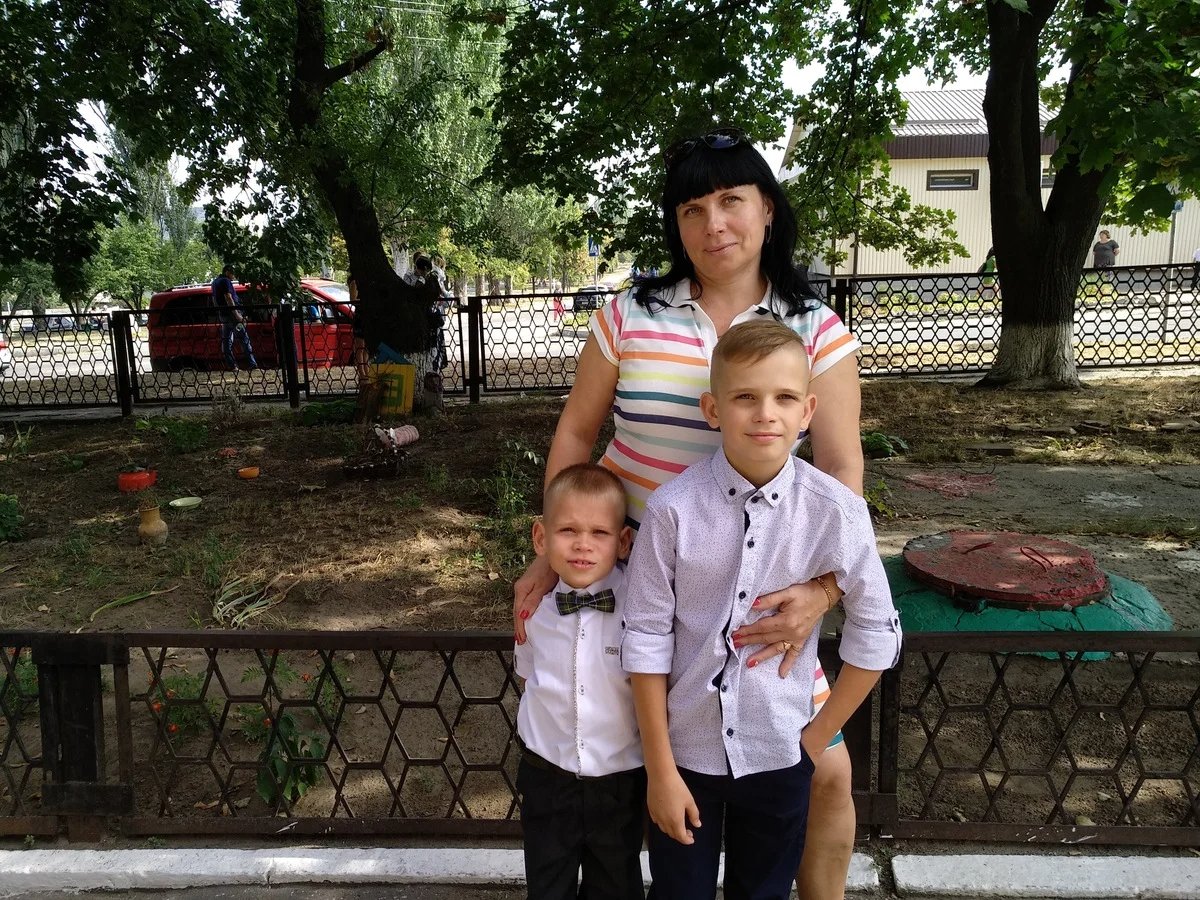
Alyona with her sons. Photo from the personal archive
“Arsenii started having episodes. He constantly suffered stomach cramps and pain symptoms because of the nerves. Illia didn’t have anything like that. He probably was scared, but he doesn’t show it. The most important thing for me was to save my children’s lives. This is why I made the decision to send them off.”
She says that a few days ago, missiles fell very close to where they live: “The entire city jumped out of their skin.” So did Alyona. She saw lights being turned on in a building next to hers — Arsenii’s friend lives there. Alyona imagined the friend’s mum and dad waking their children, quickly gathering their things, and running to the basement… And all of that at 3 AM, because the bombings always happen in the middle of the night. And then Alyona came to Switzerland and listened to Arsenii and Illia’s breathy cadence at night. She couldn’t stop listening to the quiet sounds.
When she was asked about the war by the locals in Switzerland, she couldn’t respond — her tears stopped her from answering.
“It’s just that Ukrainians are going through so much right now — it’s hell. They don’t deserve it. Especially the children. And the elderly. So many of our boys are dying,” I hear her cry on the phone. “But you have to understand, we can’t all abandon everything and go to places where everything is good. We have to think about our country too.”
It’s difficult for Alyona to talk about the happiness that has found her family in the middle of war, but for a different reason. “There are no words to explain what happened.”
“I couldn’t believe it until the last moment,” she confesses. “Until he was taken to the operating room. It was like a dream to me. As if he never had the hunchback in the first place. I look at Arsenii now and think, this is how he was supposed to be, without this illness. The fact that he’s so thin… His grandma used to say: the most important thing is to have bones, the meat will come.”
I don’t see her face but I can feel that I’m talking to a very strong woman. And I recognise the same qualities — his mother’s — in the brave boy.
Little titan
Alyona always said to her son: “Never be ashamed of your body.” She was offered to send him to a boarding school for disabled children, but Alyona sent him to a regular school. Arsenii went to PE classes with everyone, played football. His dad, a coach, clearly also had a hand in this.
Arsenii grew up to be very talkative and open (I noticed that at the beginning, in the refugee centre). His mum says that he has a lot of friends in Svitlovodsk, and she is constantly being asked about him.
“And he never despaired,” she says. “When he was suffering from pain, he tolerated it. He wouldn’t spend all his time complaining. Even when the pain was too much. He’d just lie there and cry.”
I heard the same thing from his dad:
“When he was on his way to the surgery, we were all crying out of fear. Meanwhile he waved at us, as if saying that everything was OK. Professor Farshad said to me later: ‘I’ve never seen something like this before. He’s brave!’ He said that everyone cries and screams after the surgery, but our Arsenii just quietly moaned.”
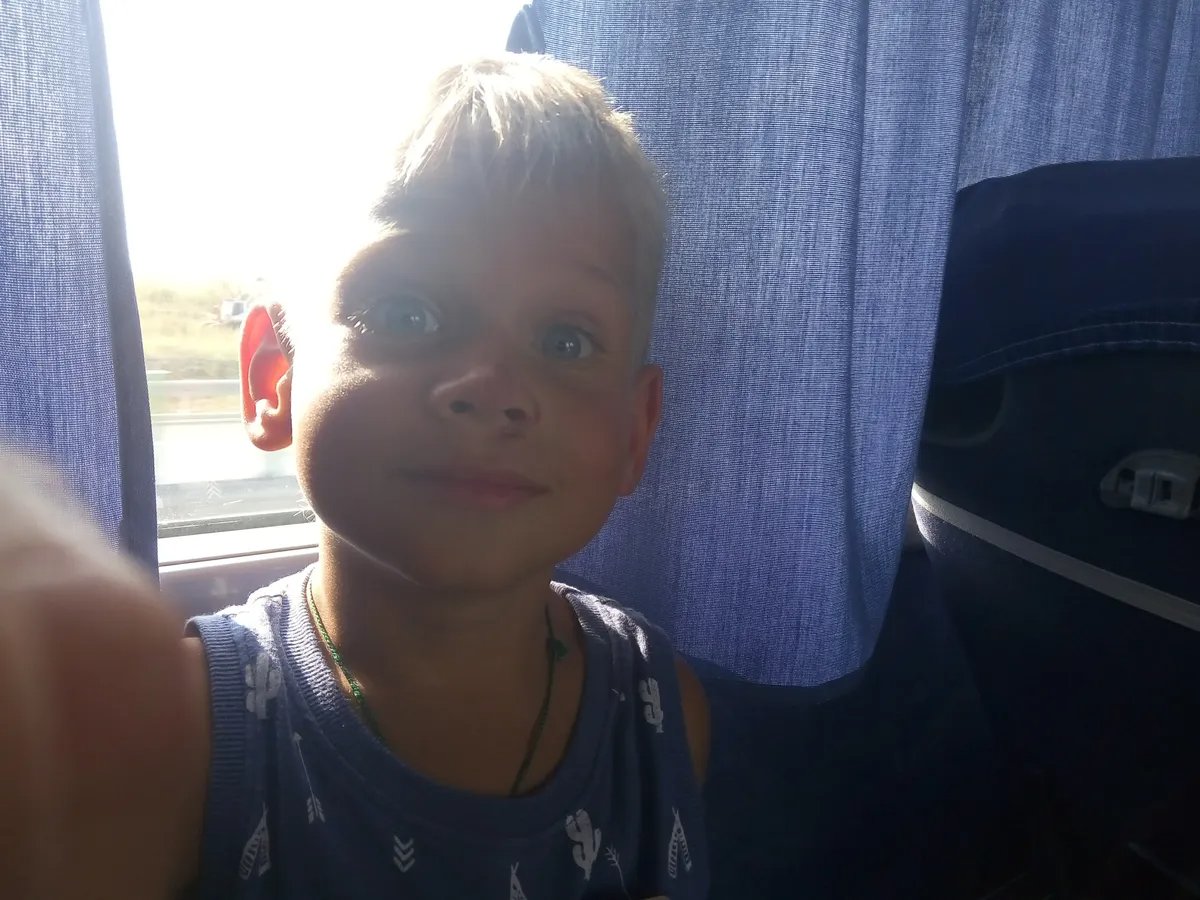
Arsenii. Photo from the personal archive
Doctor Igor Dichovski, who got the child ready for the surgery and helped the family a lot, is from Macedonia and speaks Russian well. He also pointed out that “Arsenii is a very brave boy. He behaved courageously, didn’t complain.”
I asked him to talk more about the surgery.
“Arsenii had a very complicated case of congenital scoliosis — the rib cage doesn’t develop, there are problems with the lungs,” Doctor Dichovski said. “He needed to have the surgery to have a future. The boy didn’t have pains at that point, but they would start eventually.”
“The case is very complicated. One of the hardest surgeries to do on the vertebral column. There are big risks for the patient, the child could’ve ended up disabled.”
“Which is why during the surgery we performed neuromonitoring — we checked nerve conduction. If there isn’t any, the surgery stops. In Arsenii’s case, everything went OK. At the point where the ribs are joined with the spine, some of their parts have to be moved. You need top-class skills to do that right. There are very few surgeons who can do that. And this is only possible in a big clinic. Balgrist is one of the best orthopaedics clinics in Europe.”
The doctor adds that it takes from six to twelve months after the surgery for everything to grow back together. From then on, if everything is stable, the person can live up to 100 years. And they can do anything they want to — even become a parachutist.
I’m not surprised. The name Arsenii, by the way, translates to “manly, strong”.
The most important part
“If you can,” Volodymyr tells me, “Please, write the names of all of these people in the paper.”
Of course, I can.
“Professor Farshad,” Volodymyr lists. “He’s a good human, not just a specialist. Everyone thinks of him that way in the clinic. A month after the surgery, we came down for a consultation. He saw Arsenii and quickly ran up to us, shook my hand while saying hi. It’s a very important thing to me. The geniuses I’ve met before — you can’t even walk up to them.”
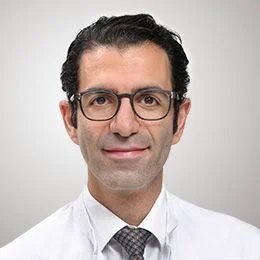
Prof. Dr. med. Mazda Farshad. Photo: balgrist.ch
This is what Alyona said about Doctor Farshad: “He gave my son a second chance at life.”
“Igor Dichovski,” Volodymyr continues. “Kindness and humanity — that’s him.”
“Igor gave me a lot of support,” Alyona adds. “He explained everything to me, acted as a translator. In Ukraine, we have a lot of children with scoliosis, but I’ve never heard of a surgery of this kind being successful. I’ve heard of cases where the legs get paralysed. I had my doubts whether we should go through with the surgery, when there’s this risk. But Igor calmed me down, told me that they would be controlling the spinal cord the entire time. And I was actually calm.”
“Switzerland, for accepting us as refugees. For their care, attention, respect. The medical staff of the ICU department, anaesthesiologists, neurologists, and all the doctors,” Volodymyr goes on.
“I don’t speak German,” Alyona adds. “But they’re so in tune with this pain that everything worked well without a translator. Arsenii was a very complicated case. When a person had half of their spine cut up, that’s not surprising. And they reacted to even the smallest of my movements. For example, they’d see me stand up on camera, and they’d immediately come in — they were that scrupulous! There was also rehabilitation doctor Paolo, who made Arsenii walk again. And especially one curvy nurse with a short haircut.
“Thank you, everyone!”
Serious robot
“How are you feeling?” I ask our protagonist.
“I’m like a robot right now,” Arsenii replies in a quite human voice.
His body still has to get used to the changes. When Arsenii walks, he sometimes wobbles. But he walks by himself — Volodymyr has stopped taking him to school.
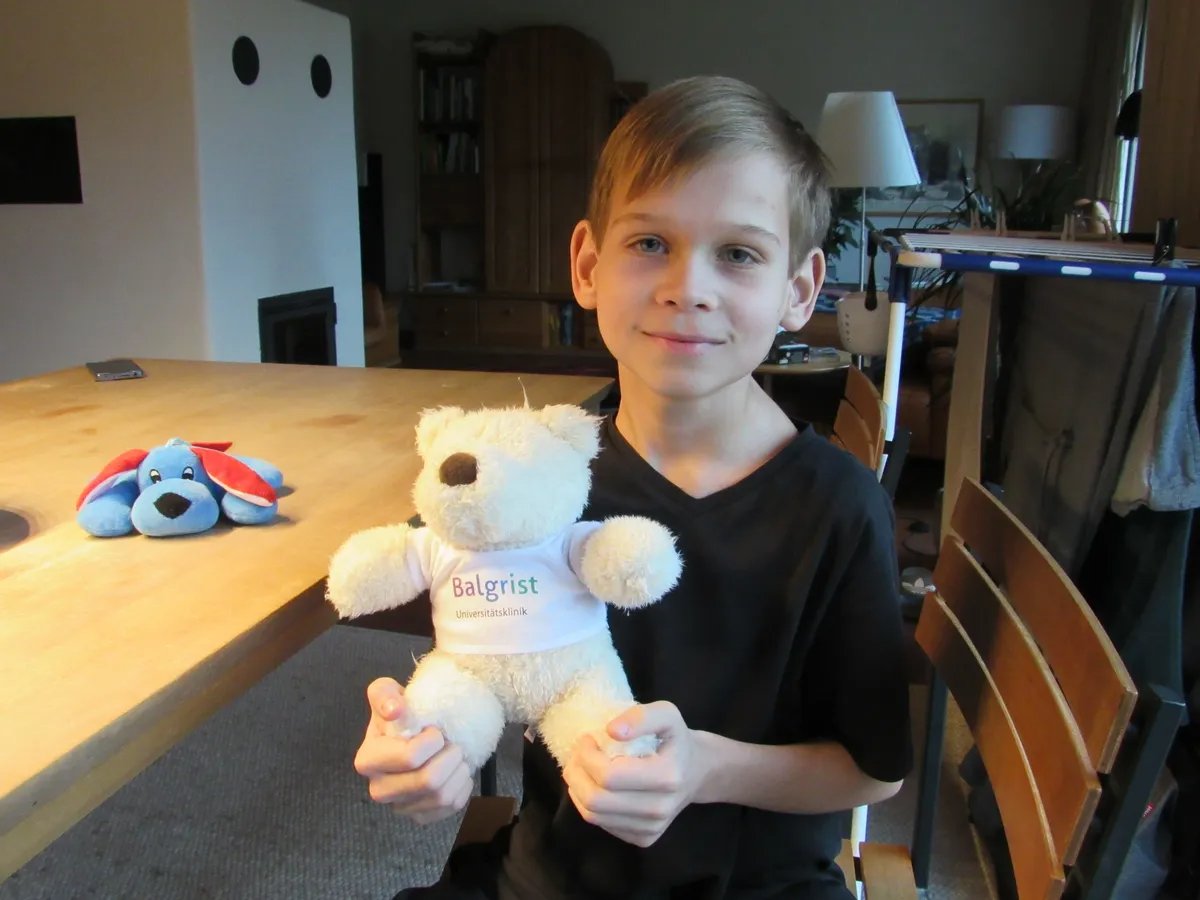
Arsenii Kolesnik. Photo: Ekaterina Glikman for Novaya Gazeta Europe
Here, in Switzerland, Arsenii is a pupil in a normal class. He has never had German classes before. The school has a rule — pupils aren’t allowed to use phones, even for translation.
“So you were thrown into the deep end like a puppy?” I ask.
“A puppy can swim from birth,” Arsenii answers. “Even a small kitten can swim!”
“You talked to the cook too, somehow. Back then, you didn’t know any German. Do you now?”
“Yes. Hunger is hungry.”
It seems that Arsenii will gain weight swiftly.
When I took a photo of him, he made a frowny face.
“Why are you frowning, Arsenii?” I asked.
“Because when I smile, I have a stupid face,” he replied.
Let this be the fearless boy’s biggest hang-up.
Join us in rebuilding Novaya Gazeta Europe
The Russian government has banned independent media. We were forced to leave our country in order to keep doing our job, telling our readers about what is going on Russia, Ukraine and Europe.
We will continue fighting against warfare and dictatorship. We believe that freedom of speech is the most efficient antidote against tyranny. Support us financially to help us fight for peace and freedom.
By clicking the Support button, you agree to the processing of your personal data.
To cancel a regular donation, please write to [email protected]
